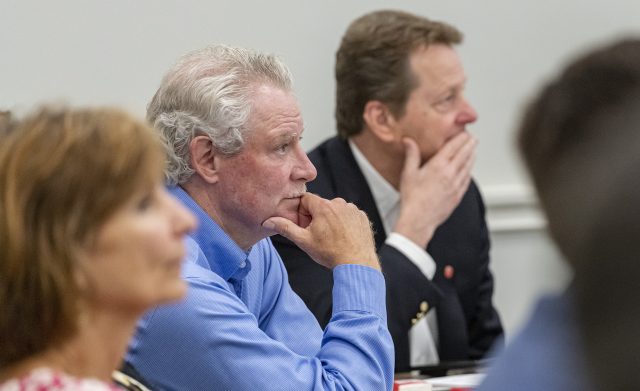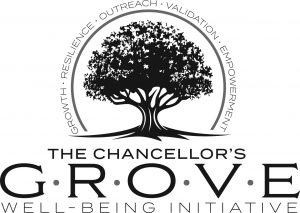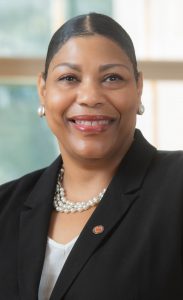
Chancellor Glenn Boyce (center) and other senior university leaders attend Mental Health First Aid training as a part of the ongoing Chancellor’s GROVE Well-Being Initiative. The initiative focuses on increasing awareness and use of campus services surrounding mental, physical and social well-being. Photo by Sri Chattopadhyay/Ole Miss Digital Imaging Services
OXFORD, Miss. – The University of Mississippi is launching a new project to raise awareness of wellness services and assess the campus environment surrounding physical, mental and social health.
The yearlong Chancellor’s GROVE Well-Being Initiative aims to help students, faculty and staff understand the importance of wellness and the challenges faced by individuals going through crises.
Citing a growing national need for better understanding and promotion of wellness on college campuses, Chancellor Glenn Boyce created the Well-being Initiative Task Force in spring 2023 to address that need.
“The University of Mississippi recognizes that mental, physical and social health are vital components of well-being for individuals, for communities and for society as a whole,” Boyce said. “We also recognize that the challenges surrounding health are growing, and this new initiative will aid us in creating a broadened support system that will help all members of the campus community thrive.”
The university’s 2023 Student Voice survey on health and wellness found that more than 56% of students have experienced chronic stress, and three of four students say improving their overall wellness is a top priority.
The task force met throughout the summer to create the Chancellor’s GROVE Well-Being Initiative, the key elements of which are growth, resilience, outreach, validation and empowerment.
 These themes will guide faculty, staff and students across campus in their efforts to elevate the practice of wellness, organize events surrounding health and promote awareness of the signs that indicate someone maybe experiencing distress.
These themes will guide faculty, staff and students across campus in their efforts to elevate the practice of wellness, organize events surrounding health and promote awareness of the signs that indicate someone maybe experiencing distress.
“We are all in this together,” said Juawice McCormick, director of University Counseling Center. “We are family at Ole Miss and family takes care of each other. Family makes sure that resources are available.
“Our mental health and well-being are just as important as caring for physical health; the two are inextricably connected.”
One goal is to make members of the campus better allies to those who are in distress, said Charlotte Pegues, vice chancellor for student affairs.
“Sometimes you know that someone is going through a crisis, but you don’t know how to respond,” Pegues said. “We want to give them the tools to help others and to help themselves.
“The more people who know, the more likely a student in need is to meet someone who can help them.”
University leaders completed Mental Health First Aid training in August. This skills-based certification teaches participants to identify, understand and respond to psychological health issues or substance use.
“As a flagship institution, our leadership team is leading by example in earning the Mental Health First Aid certification and demonstrating our dedication to improving evidence-based mental health support services and initiatives to more fully serve our campus community,” Boyce said.
Allison Ford-Wade, associate dean of community engagement for the School of Applied Sciences, initiated MHFA training on campus. She has since secured funding to expand the training to faculty and staff. To schedule a training session, visit the MHFA page on the Counseling Center website.
This fall, the university embedded counselors and therapists in three student-centered units: the William Magee Institute for Student Wellbeing, Office of Veteran and Military Services and the Graduate School.
“Students who are healthy and well are successful in several ways and persist toward graduation,” McCormick said. “We are all here to help support students in their Ole Miss experiences and to help them continue with success in wellness as they move toward their futures beyond UM.”
One of the initiative’s primary goals is to make campus members more aware of the resources already available to them, Pegues said. All students over age 18 are eligible for counseling services at the University Counseling Center. Substance use support and cessation services are available through the William Magee Center.
The Ole Miss athletics department provides students an in-house counselor under the direction of Josie Nicholson, assistant athletics director for sport psychology.
Finding the right help among a wealth of resources, however, can be challenging. The GROVE initiative will help students find the service that best fits their needs, Pegues said.
“Chancellor Boyce, along with many others, recognizes the need to educate and provide resources to our community; that’s the purpose of this initiative,” she said.
Sara Austin Welch, Associated Student Body president and a senior public policy leadership major from McCarley, is one of the students serving on the initiative leadership team.
“We’re trying to cultivate a healthy environment to better serve our students, faculty and staff,” Welch said. “How you develop habits right now will stay with you for the rest of your life.
“I think it’s really important to learn how to take care of yourself and love yourself right now, where you are.”
ASB has also added a director of mental health to its board to help increase awareness, she said. Connor Gee, a sophomore general business major from Madison, will serve in this role on the ASB’s Division of Health and Wellness.
“I hope that the students learn that Ole Miss really cares,” Welch said. “You don’t think that the faculty, staff and administration can care as much as they do, but I’ve been shown time and again that they do.
“I want them to know they’re not alone.”
